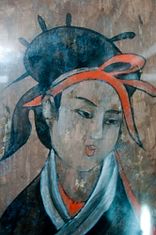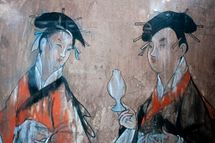Emperor Ling
| Emperor Ling of Han | |||||||||||||
|---|---|---|---|---|---|---|---|---|---|---|---|---|---|
| Emperor of the Han Dynasty | |||||||||||||
| Reign | 168–189 | ||||||||||||
| Born | 156 | ||||||||||||
| Died | 13 May 189 (aged 32–33) | ||||||||||||
|
|||||||||||||
| Dynasty | Han dynasty | ||||||||||||
| Full name | |
|---|---|
|
|
| Era dates | |
|
|
| Posthumous name | |
| Xiàolíng (孝靈) literary meaning: "filial and unattentive" |
| Murals of the Dahuting Tomb (Chinese: 打虎亭汉墓, Pinyin: Dahuting Han mu) of the late Eastern Han Dynasty (25-220 AD), located in Zhengzhou, Henan province, China, showing scenes of daily life. | |||||
|---|---|---|---|---|---|
|
|||||
Emperor Ling of Han (traditional Chinese: 漢靈帝; simplified Chinese: 汉灵帝; pinyin: Hàn Língdì; Wade–Giles: Han Ling-ti; 156 – May 13, 189), was an emperor of the Chinese Han dynasty. He was a great-great-grandson of Emperor Zhang. The Yellow Turban Rebellion broke out during Emperor Ling's reign.
Emperor Ling's reign saw yet another repetition of government domination by corrupt eunuchs. This time Zhang Rang and his accomplices succeeded in completely dominating the political scene after prevailing over Empress Dowager Dou's father Dou Wu and his ally, the Confucian scholar Chen Fan (陳蕃) in 168. Emperor Ling, even after he grew to adulthood, was not interested in governmental affairs, instead indulged himself in women and a decadent lifestyle. At the same time corrupt officials levied heavy taxes on the peasants causing public outcries and rebellions. He further exacerbated the situation by selling political offices for money.
Emperor Ling died in 189 at the age of 34, after reigning for 21 years. After his death the power fell into the hands of Dong Zhuo, who despised him. Emperor Ling was one of the rare examples of history in which an emperor whose throne was inherited by a son received a highly derogatory (but accurate) posthumous name.
Emperor Ling's reign left the Eastern Han dynasty weak and ready to crumble. After his death, the empire broke apart, and for several decades warlords battled, until eventually his son Emperor Xian was forced to abdicate in favor of Cao Pi, ushering in the era of the Three Kingdoms period. (See End of the Han dynasty.)
...
Wikipedia




